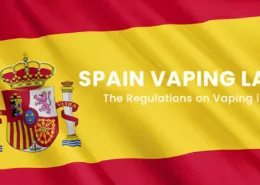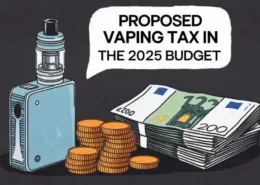Poland Proposed Double Tax on Vaping Products
The Polish government approved a draft amendment in January to expand excise taxes on nicotine alternatives, including reusable e-cigarettes, heated tobacco devices, and nicotine pouches. The proposal introduces a 40 PLN per-unit tax on vaping hardware and parts, while increasing taxes on disposable e-liquid content by 40 PLN. Industry groups warn this could raise retail prices by 50 PLN per device, potentially driving consumers back to combustible cigarettes or unregulated markets.
Double Taxation Risks for Reusable Devices
Business Centre Club tax advisor Szymon Parulski highlights a critical flaw: “The 40 PLN tax on both hardware and liquid creates dual taxation for reusable systems. This could erase 80% of the legal market, leaving space for illicit traders.” The controversy centers on ambiguous definitions of taxable items. For example, prefilled pods already face e-liquid taxes, but empty pods and control modules in multi-use kits might incur three separate levies under the proposal.
Marcin Nowacki, Vice President of the Union of Entrepreneurs and Employers (ZPP), explains: “If regulators tax both the device and cartridge, consumers face an 80 PLN surcharge. At that price, legal products become unsustainable.”
Black Market Projected to Expand
Poland’s vaping industry already battles a thriving gray market, which accounts for 32-50% of e-liquid sales. Experts predict the tax hike will worsen this trend. Nowacki states: “Consumers will either return to smoking or buy untaxed products online. Current laws can’t stop cross-border sales.”
Data from the Public Health Federation reveals empty cartridges – primarily manufactured domestically – would also face excise taxes, incentivizing consumers to seek cheaper underground alternatives.
Health Experts Warn of Backward Progress
Prof. Andrzej Sobczak of the Medical University of Silesia emphasizes that vaping and heated tobacco devices reduce harm by avoiding combustion. “These smokeless alternatives cut exposure to carcinogens found in traditional cigarettes. Penalizing them contradicts public health goals,” he notes.
ZPP criticizes the legislation for ignoring risk-proportionate taxation models, like Sweden’s system that aligns taxes with product harm levels. “This policy pushes people toward more dangerous options,” says Nowacki.
Industry Condemns Lack of Consultation
Trade associations accuse the Ministry of Finance of bypassing stakeholder input. Nowacki argues: “Excluding manufacturers and retailers from discussions guarantees market chaos. Legal businesses will collapse, while illegal sellers thrive.”
The law is scheduled to take effect in phases:
- April 1, 2025: General provisions
- July 1, 2025: Vaporizer and e-liquid taxes
- August 1, 2025: Nicotine pouch regulations








